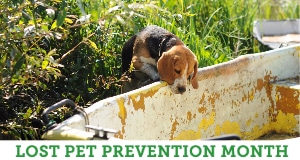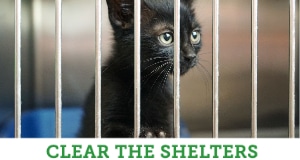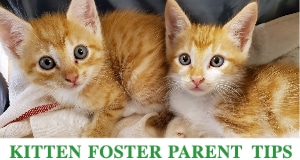
Lost Pet Prevention Month
July 10, 2020
August is Clear the Shelters Month
August 8, 2020The Tulsa SPCA Foster Program is always looking for people who will open their hearts and homes to kittens. Whether you want to take on a pair or a whole litter, we will set you up for success. We provide you with supplies, training and support so you can care for your foster kittens until we’re able to find forever homes for them. We have a great FAQ section on our foster web page, but here are some kitten-specific things you might want to know if you decide to make room for some tiny cats.
Preparing for Fostering Kittens
The Tulsa SPCA will provide any supplies you need for your foster kittens. There are some things you can do at home to get ready for them, though.
You’ll want to prepare a safe space for your foster kittens away from other animals. Locate a small, climate-controlled space in your home with a comfortable temperature and a door that closes. Make sure the area is kitten-proof — you’ll be amazed what trouble kittens can get into. For instance, check there is not a trash can or toilet they can fall into, a curtain they can climb, a toxic plant they can eat, or a small space they can hide or get stuck in.
Caring for Kittens
The Tulsa SPCA will send you home with all the supplies you need to help your kittens eat, poop and sleep. This is just about all they’ll do when they’re tiny!
- Feed them
-
- Kittens 0-4 weeks with no mom will need to be bottle fed using formula designed for kittens. Never give cow’s milk to a kitten — this is very dangerous! Learn some helpful tips for bottle feeding orphaned kittens here.
- Kittens 4-5 weeks are weaning and can eat slurry, a combination of formula and wet kitten food. Learn about slurry here.
- Kittens 5-6 weeks plus can generally eat wet kitten food (or completely soaked dry kitten food). Provide fresh water at all times as well.
- Show them the litter box immediately
-
- Kittens above 3 weeks should be immediately placed into the litter box, so they learn right away where to use the bathroom. If they are already peeing and pooping on their own, they should show interest in the box.
- If they are not yet pooping and peeing on their own (which begins around 3 weeks) you will need to stimulate them to go to the bathroom. Learn about stimulating kittens here http://www.kittenlady.org/stimulating. When they are learning to use the litter box, you can do this over the box so they associate the box with using the bathroom.
- Show them their cozy spot
-
- Place them in the area where they can be warm and comfortable. Make sure they have access to the covered heating pad (we’ll provide you with one), but also a way to get away from it if they get too warm.
- Let them sleep — kittens sleep a lot. Give them plenty of time to rest.
Establish a Kitten Routine
Get the kittens on a routine. Every few hours, you should be stimulating them, feeding them, and showing them their safe space so they can safely sleep. As they get older, you can factor in some play time.
- Kittens 0-1 weeks: bottle feeding/stimulating every 2 hours
- Kittens 1-2 weeks: bottle feeding/stimulating every 2-3 hours
- Kittens 2-3 weeks: bottle feeding/stimulating every 3 hours
- Kittens 3-4 weeks: bottle feeding/stimulating every 4 hours
- Kittens 4-5 weeks: weaning and beginning to use bathroom on their own – feeding every 5-6 hours
- Kittens 5-6 weeks: weaning, using litter box – feeding every 6-8 hours
- Kittens 6-8 weeks: weaned, using litter box – feeding every 8 hours
- Kittens 8+ weeks: the Tulsa SPCA will schedule spay/neuter appointments for the kittens so they can be adopted!
Veterinary Care for Kittens
When you pick up kittens from the Tulsa SPCA, they’ll get an exit exam from our veterinarian. It’s a good idea to check your kittens frequently and to contact the Tulsa SPCA clinic should these conditions occur:
- Gasping for air, cannot breathe – Contact after hours medical phone number included on your foster paperwork as this is considered an emergency.
- Suffering from infection in the eyes or skin – Contact the foster phone number included on your foster paperwork. This is considered a non-emergency.
- Bleeding from any orifice – Contact after hours medical phone included on your foster paperwork as this is considered an emergency.
- Limp/lethargic – Contact the foster phone number included on your foster paperwork. This is considered a non-emergency.
Kittens are extremely vulnerable little things. Here are some additional things you need to keep your eye out for:
Dehydration
Dehydration is deadly in kittens, causing the organs to shut down. You can tell if a kitten is dehydrated by doing a simple “tent test.” Pinch the skin on the scruff of the neck. If the skin immediately falls back into place, the kitten is hydrated. If the skin forms a “tent” and takes a moment to go back down, the kitten is dehydrated. Call the foster number so our staff can either walk you through some steps to assist the kitten or advise you to bring kitten to our clinic right away.
Constipation
Monitor each kitten’s bowel movements closely — if you’re caring for a litter, check that every kitten is pooping regularly. Make sure they have lots of fresh water to drink. Mix any dry food with water 10 minutes before feeding. If a kitten has not pooped for more than 2 days, call the foster number and get your kitten to our clinic right away.
Diarrhea
Persistent diarrhea can cause dehydration. If your kitten has diarrhea longer than a day or two, call the foster number and get your kitten to our clinic right away.
Let’s get started
Now that you have an idea of what it is like to foster kittens, let’s get you signed up! Please apply to become a foster parent here. If you have any questions, contact foster@tulsaspca.org or text 918-264-4935.


